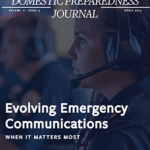Underpinning any public health emergency response is a complex legal and regulatory framework. Understanding the interplay between the legislative, executive and judicial branches of government is key to ensure policies and actions are based on solid legal footing. This podcast examines the role of the judicial branch and explores how the Tribal Legal Preparedness Project at the University of Pittsburgh Center for Public Health Practice is working to enhance the legal preparedness of tribal nations. There are 573 federally recognized Indian tribes across 35 states in the United States. These tribal governments are sovereign entities and operate within their own authority to create and enforce their own laws, including those that would be used to respond to public health emergencies.
Legal preparedness is a vital component of emergency preparedness for all jurisdictions, including sovereign tribal nations. For example, in an infectious disease outbreak, tribal nations may need to quarantine their members. If laws, policies, and procedures are not in place, that process can be complicated, particularly if jurisdictional issues arise due to the location of the tribal member. This can also lead to delays in protecting public health.
In this podcast, Domestic Preparedness Advisor and attorney Andrew Roszak discusses the importance of enhancing legal preparedness capacity before disasters. He is joined by Tina Batra Hershey, JD, MPH, who is an assistant professor in the Department of Health Policy and Management at the University of Pittsburgh Graduate School of Public Health, an adjunct professor at the University of Pittsburgh School of Law, and the associate director of law and policy at the Center for Public Health Practice.
Read The Importance of Legal Preparedness for Tribal Nations
Presented by:
Andrew Roszak

Andrew R. Roszak
Andrew Roszak, JD, MPA, EMT-P, serves as the executive director for the Institute for Childhood Preparedness and as an advisor for the Domestic Preparedness Journal. He is the author of the Preparing for the Unexpected Series of books, which includes “Preschool Preparedness for an Active Shooter.” He has spent over 20 years working on emergency preparedness, response, and recovery issues. He is admitted to the Illinois and District of Columbia Bars and is admitted to the Bar of the U.S. Supreme Court. Find him on Twitter: @AndyRoszak.
- Andrew R. Roszakhttps://domesticpreparedness.com/author/andrew-r-roszak
- Andrew R. Roszakhttps://domesticpreparedness.com/author/andrew-r-roszak
- Andrew R. Roszakhttps://domesticpreparedness.com/author/andrew-r-roszak
- Andrew R. Roszakhttps://domesticpreparedness.com/author/andrew-r-roszak

Tina Batra Hershey
Tina Batra Hershey, JD, MPH, is an assistant professor in the Department of Health Policy and Management at the University of Pittsburgh Graduate School of Public Health, an adjunct professor at the University of Pittsburgh School of Law, and the associate director of law and policy at the Center for Public Health Practice. She is actively involved in state and national programs involving legal preparedness, as well as efforts to enhance tribal legal preparedness for public health emergencies. She is a frequent national speaker on legal preparedness issues and has co-authored two public health emergency law manuals and bench books. Her research interests also include law and policy issues related to the delivery and quality of health care services, as well as health equity. Before coming to Pitt Public Health, she was a health care attorney in Washington, D.C., and Pittsburgh, Pennsylvania. She is a cum laude graduate of Villanova University and received a joint Juris Doctor (with honors) and Master of Public Health in Health Policy from The George Washington University.
- Tina Batra Hersheyhttps://domesticpreparedness.com/author/tina-batra-hershey








